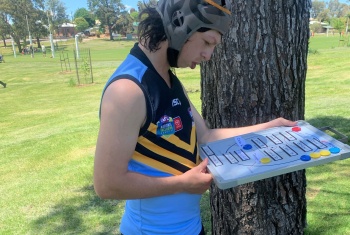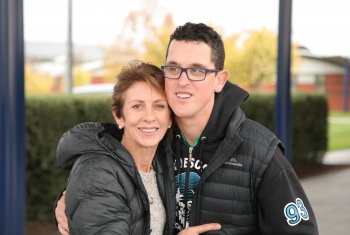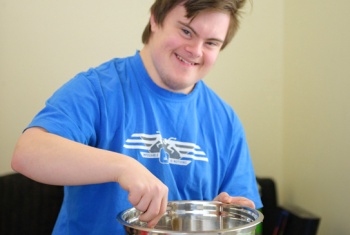The process of entering the NDIS is an exciting but sometimes uncertain change for many families.
For Victoria’s Benson family, a supportive Local Area Coordinator made the change easier.
James, 24, has an intellectual disability and is described by his dad Ernie as a “lovely, loving kid, with good morals.”
Since joining the NDIS earlier in 2018, James’ world has expanded. He didn’t receive any support prior to becoming an NDIS participant. Now he has his forklift licence and receives some support at home to help him build up his life skills, including things like cooking and budgeting.
“In the past 12-18 months, he’s changed a lot,” Ernie said.
“He’s opening up more than he ever has before, because he’s going to work and he’s in a pool competition.”
The Benson's worked with Tricia, a Local Area Coordinator from La Trobe Community Health to create James’ very first NDIS plan.
“The lady we dealt with at the NDIS, Tricia, was good from the get-go,” Ernie said.
“She was a great point of contact for us and everything was explained. She made it really clear to us what we were entitled to. At the start, we were a little bit worried we wouldn’t get what we needed.”
Local Area Coordinators (LACs) are an important part of the transition to the NDIS. LACs work with participants on the ground to help them access and make the most of the Scheme.
Importantly, LACs also connect people with disability to supports, services, activities in their community and other government services. LACs work in communities to help them become more accessible and inclusive for all people with disability.
“One of the roles of an LAC is to meet with a participant and their support people to discuss what supports they require, what their goals are, and how the NDIS can assist them to move forward to achieve those goals,” Tricia explained.
According to Tricia, a planning meeting will generally start with introductions and some short formalities, such as checking the participants’ identity.
“Then I tend to ask the participant if they have any helpful information or assessments they would like to provide, as that can often help to start discussions about their life.”
“We have plenty of discussion about the participant,” Tricia said.
“It’s a good time for the participant and their family to get through any angst they might have around their first plan, especially people who haven’t had support before and don’t know what to expect.
“We spend time discussing what is reasonable and necessary according to the NDIS, and finding other ways we can meet the participants’ needs that may not be directly funded by the NDIS.
“We also have some set questions that need to be answered, and then at the end we write down the conversation and discuss the rest of the process – approval, plan implementation etc., and make sure the participant has the LAC contact details.”
Tricia’s advice for participants ahead of their planning meeting is to be prepared.
“I would say - don’t be nervous. Have some goals, and think about how those goals relate to the support you require NDIS funding for.
Ernie’s advice is simple: “Contact the local NDIS office!”
He hopes other families can make the most of the NDIS, just as his family has been able to.
“James has got a good outcome, the NDIS will be really good for him.”
To assist participants to think about their goals, a new planning booklet has been released. Participant Booklet 2 – Planning, is available on the NDIS website (It is also available in Easy English).
The NDIA is also introducing a new plan with improvements to make the plan clearer and simpler to understand. The new plan will become available to participants when they receive their first plan or have a plan review.


